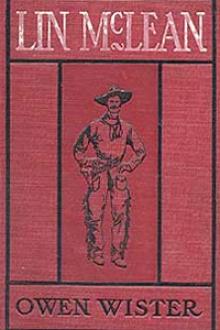The Virginian: A Horseman of the Plains, Owen Wister [best e books to read txt] 📗

- Author: Owen Wister
Book online «The Virginian: A Horseman of the Plains, Owen Wister [best e books to read txt] 📗». Author Owen Wister
“It is quite a while after sunset,” he heard himself say.
A wind seemed to blow his sleeve off his arm, and he replied to it, and saw Trampas pitch forward. He saw Trampas raise his arm from the ground and fall again, and lie there this time, still. A little smoke was rising from the pistol on the ground, and he looked at his own, and saw the smoke flowing upward out of it.
“I expect that's all,” he said aloud.
But as he came nearer Trampas, he covered him with his weapon. He stopped a moment, seeing the hand on the ground move. Two fingers twitched, and then ceased; for it was all. The Virginian stood looking down at Trampas.
“Both of mine hit,” he said, once more aloud. “His must have gone mighty close to my arm. I told her it would not be me.”
He had scarcely noticed that he was being surrounded and congratulated. His hand was being shaken, and he saw it was Scipio in tears. Scipio's joy made his heart like lead within him. He was near telling his friend everything, but he did not.
“If anybody wants me about this,” he said, “I will be at the hotel.”
“Who'll want you?” said Scipio. “Three of us saw his gun out.” And he vented his admiration. “You were that cool! That quick!”
“I'll see you boys again,” said the Virginian, heavily; and he walked away.
Scipio looked after him, astonished. “Yu' might suppose he was in poor luck,” he said to McLean.
The Virginian walked to the hotel, and stood on the threshold of his sweetheart's room. She had heard his step, and was upon her feet. Her lips were parted, and her eyes fixed on him, nor did she move, or speak.
“Yu' have to know it,” said he. “I have killed Trampas.”
“Oh, thank God!” she said; and he found her in his arms. Long they embraced without speaking, and what they whispered then with their kisses, matters not.
Thus did her New England conscience battle to the end, and, in the end, capitulate to love. And the next day, with the bishop's blessing, and Mrs. Taylor's broadest smile, and the ring on her finger, the Virginian departed with his bride into the mountains.
XXXVI. AT DUNBARTON
For their first bridal camp he chose an island. Long weeks beforehand he had thought of this place, and set his heart upon it. Once established in his mind, the thought became a picture that he saw waking and sleeping. He had stopped at the island many times alone, and in all seasons; but at this special moment of the year he liked it best. Often he had added several needless miles to his journey that he might finish the day at this point, might catch the trout for his supper beside a certain rock upon its edge, and fall asleep hearing the stream on either side of him.
Always for him the first signs that he had gained the true world of the mountains began at the island. The first pine trees stood upon it; the first white columbine grew in their shade; and it seemed to him that he always met here the first of the true mountain air—the coolness and the new fragrance. Below, there were only the cottonwoods, and the knolls and steep foot-hills with their sage-brush, and the great warm air of the plains; here at this altitude came the definite change. Out of the lower country and its air he would urge his horse upward, talking to him aloud, and promising fine pasture in a little while.
Then, when at length he had ridden abreast of the island pines, he would ford to the sheltered circle of his camp-ground, throw off the saddle and blanket from the horse's hot, wet back, throw his own clothes off, and, shouting, spring upon the horse bare, and with a rope for bridle, cross with him to the promised pasture. Here there was a pause in the mountain steepness, a level space of open, green with thick grass. Riding his horse to this, he would leap off him, and with the flat of his hand give him a blow that cracked sharp in the stillness and sent the horse galloping and gambolling to his night's freedom. And while the animal rolled in the grass, often his master would roll also, and stretch, and take the grass in his two hands, and so draw his body along, limbering his muscles after a long ride. Then he would slide into the stream below his fishing place, where it was deep enough for swimming, and cross back to his island, and dressing again, fit his rod together and begin his casting. After the darkness had set in, there would follow the lying drowsily with his head upon his saddle, the camp-fire sinking as he watched it, and sleep approaching to the murmur of the water on either side of him.
So many visits to this island had he made, and counted so many hours of revery spent in its haunting sweetness, that the spot had come to seem his own. It belonged to no man, for it was deep in the unsurveyed and virgin wilderness; neither had he ever made his camp here with any man, nor shared with any the intimate delight which the place gave him. Therefore for many weeks he had planned to bring her here after their wedding, upon the day itself, and show her and share with her his pines and his fishing rock. He would bid her smell the first true breath of the mountains, would watch with her the sinking camp-fire, and with her listen to the water as it flowed round the island.
Until this wedding plan, it had by no means come home to him how deep a hold upon him the island had taken. He knew that he liked to go there, and go alone; but so little was it his way to scan himself, his mind, or his feelings (unless some action called for it), that he first learned his love of the place through his love of her. But he told her nothing of it. After the thought of taking her there came to him, he kept his island as something to let break upon her own eyes, lest by looking forward she should look for more than the reality.
Hence, as they rode along, when the





Comments (0)